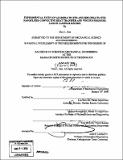Experimental study of alumina-water and zirconia-water nanofluids convective heat transfer and viscous pressure loss in Laminar regime
Author(s)
Rea, Ulzie L
DownloadFull printable version (5.604Mb)
Other Contributors
Massachusetts Institute of Technology. Dept. of Mechanical Engineering.
Advisor
Lin-Wen Hu and Jacopo Buongiorno.
Terms of use
Metadata
Show full item recordAbstract
The objective of this study is to evaluate experimentally the convective heat transfer and viscous pressure loss characteristics of alumina-water and zirconia-water nanofluids. Nanofluids are colloidal dispersions of nanoparticles in metal, metal oxide, carbon-based materials in base fluids, and may offer improved heat transfer properties compared with pure base fluids. A flow loop with a vertical heated section was designed and constructed to operate in the laminar flow regime (Re<2000). Initial tests were conducted with deionized water for experiment validation. Alumina nanofluid was tested in the flow loop at four different volumetric loadings, 0.6%, 1%, 3% and 6% and zirconia nanofluid was tested at volumetric loadings of 0.3%, 0.64% and 1.3%. The experimental results, represented in Nusselt number (Nu) and dimensionless length x+, are in good agreement with traditional model predictions if the loading- and temperature- dependent thermophysical properties are utilized. Measured pressure loss of the nanofluid is within 20% of theory. It is concluded that the laminar convective heat transfer and viscous pressure loss behavior of alumina-water and zirconia-water nanofluids can be predicted by existing models as long as the correct mixture properties are used, and there is no abnormal heat transfer enhancement.
Description
Thesis (S.B.)--Massachusetts Institute of Technology, Dept. of Mechanical Engineering, February 2008. "January 2007." Includes bibliographical references (leaves 69-70).
Date issued
2008Department
Massachusetts Institute of Technology. Department of Mechanical EngineeringPublisher
Massachusetts Institute of Technology
Keywords
Mechanical Engineering.